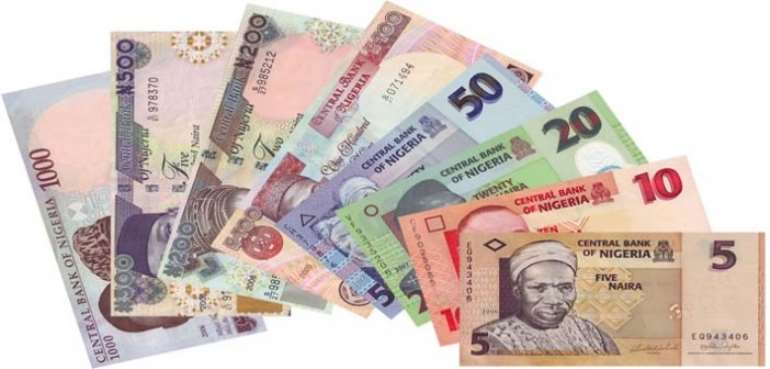Firm Predicts Further Naira Devaluation after Elections

A research and financial advisory firm, the WSTC, Financial Services Limited has predicted another adjustment in the naira exchange rate band against the dollar after the 2015 elections.
The firm stated this in its '2014 Economic Review and 2015 Outlook,' made available to THISDAY at the weekend.
It also anticipated that the demand pressure in the forex market would be sustained by investors' concern about sliding oil prices, low fiscal buffers and political uncertainties in the interim period after the general elections.
Furthermore, it argued that the firming up of the US economy as well as expectations of higher interest rates in the US presents capital reversal risks.
'On the basis of these, and given the need to forestall further haemorrhaging of foreign reserves, we expect a further adjustment of the mid-point of the value of the naira by the CBN after the general elections.
'We reckon that this will both engender reserve accretion and also boost government earnings from crude oil in naira terms,' it added.
Nigeria's external reserves dropped by 27 per cent in 2014, from $43.51 billion at the beginning of the year to $34.47 billion on December 31, 2014, as a result of a combination of global and domestic influences.
It stated: 'The true equilibrium of the NGN/US$ exchange rate is yet to be attained, and this suggests that the devaluation in the exchange rate was rather partial that is not reflecting the level that can be conveniently supported by the fundamentals of the Nigerian economy, especially given the new trend of crude oil prices.
'A further commitment by the CBN to the defence of the naira in 2015 implies that the apex bank will have to continue to sacrifice external reserves on the altar of a strong value of the naira and based on the foregoing, and particularly given the commitment of the CBN to continue to defend the value of the naira, we expect further depletion of the nation's stock of external reserves in 2015.'
On the falling oil prices and its effects on the proposed 2015 budget, it stated: 'Plunging oil prices and Nigeria's excessive reliance on oil revenue as the principal source of federal government earnings has exposed the nation to increasing level of economic imbalance.
'In response, the federal government adopted a more aggressive drive towards income generation from non-oil sources and reduction in the cost of governance by reducing spending on overheads, rationalising existing government agencies and plugging leakages by reviewing tax exemptions and waivers.
'While we view federal government's decision to become more aggressive in diversifying the economy (an attendant blessing delivered by tumbling oil prices) as a step in the right direction, we however consider it rather a belated course of action.
'Also, we are of the opinion that the additional revenue (and savings) expected to be generated (and achieved) through these measures will be far below what will be required to cover up for the shortfall in income from crude sources.'
It also predicted that the performance of the Nigerian equities market would remain subdued in the first half of 2015 on account of weak oil prices and elevated domestic political risks. 'However, we reckon that moderate rebound in oil prices and receding concerns about political uncertainty should jump-start equities market rally in second half 2015,' it stated. Thisday
